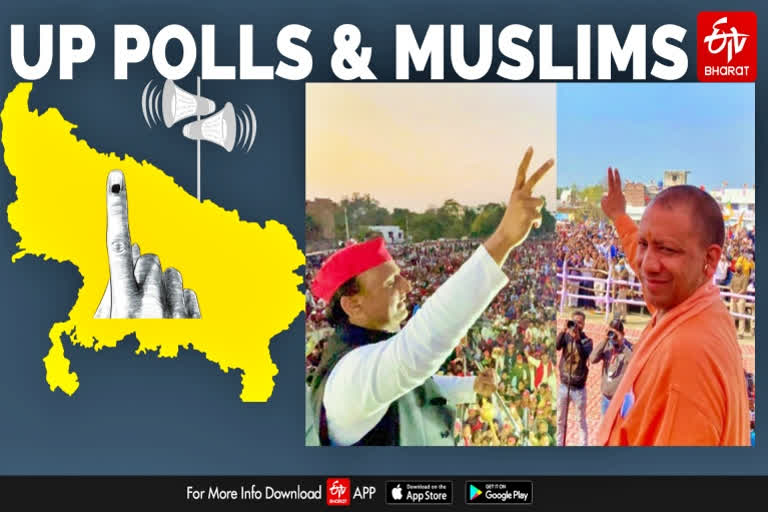One of Yogi Adityanath’s controversial statements was about this election being 80 percent versus 20 percent. It was an indirect reference to majority and minority communities and an attempt to mobilise Hindu votes to counter the consolidation of Muslims either in favour of a party or an alliance like that of Samajwadi Party (SP) and the Rashtriya Lok Dal (RLD) of Jayant Chaudhary.
As elections in UP are fought on caste and communal lines, all eyes are on Muslims who constitute 19.3 percent of UP’s population. The western UP and Ruhelkhand districts covered in the first two rounds have a sizeable Muslim presence. In the districts going to poll in the third, fourth and fifth rounds, it is the caste dynamics which come into play.
In the first two phases Muslims are a deciding factor. Together with Jats, who are mainly farmers, they are a force to reckon with in the region. In 2017, the BJP had won 53 of the 58 seats in the first phase and 38 of the 55 seats in the second phase. The Samajwadi Party won 15 seats in the second phase which has over 40 percent Muslims in five of the nine districts. In Rampur alone Muslims account for over 50 percent of the population.
Politics in the region changed after the 2013 Muzaffarnagar riots dented the influence of Chaudhary Ajit Singh, the present RLD chief’s father. So deep was the religious divide after the riots that Jats, who traditionally voted for the RLD, moved away from the party and sided with the BJP in 2014, 2017 and 2019 elections. Now riots have been forgotten and farmers’ anger against the BJP over the three contentious farm laws enacted in 2020, has taken over. With Muslims also peeved at Yogi Adityanath government’s anti-minority stance, the SP-RLD combination is expected to checkmate the BJP.
Also read: Uttar Pradesh Polls: Tough test for BJP in central UP, Bundelkhand
These developments have made Akhilesh Yadav buoyant. Reports suggest major gains for his party in the first two phases. The optimism is based on reports that Muslims, instead of frittering away their votes on parties like the All-India Majlis-e-Ittehadul Muslimeen (AIMIM) and the BSP, voted largely in favour of the SP-RLD combine to give the alliance an edge. In 2017 Muslim vote was divided among SP, BSP, Congress, and even the BJP which won from Deoband, the seat of Islamic seminary and a Muslim stronghold.
While the Samajwadi Party in alliance with RLD is the main challenger and is hoping to turn the tide in these elections, Mayawati’s Bahujan Samaj Party fielded 17 Muslims in the first phase and 23 in the second to prevent the SP from getting en bloc support of the community. The SP is confident that the minority community will not lean at the BSP because of an Asaduddin Owaisi-like perception that Mayawati is too close to the BJP for their comfort.
There are reasons for minority voters to have this perception. In 1995 Mayawati became the chief minister with BJP’s support and later formed a coalition government with the BJP. After the seizure of a huge tranche of cash from her Noida office in a raid by the Enforcement Directorate in 2016 (post demonetisation), she went on the defensive. The Rs 104 crore seized was later returned on EC’s orders. The BSP is seen as BJP’s dependent fallback option in case it falls short of the magical numbers. Mayawati will be too happy to oblige as she can’t stand the SP.
Also read: Assembly Elections: The UP and Uttarakhand dynamics
Little wonder then that Muslims are looking at the SP-RLD combine to dislodge the BJP government. But is it going to be as easy as it sounds? At 21.82 percent, a 7.7 percent decline from 2012, the SP’s popular votes in 2017 were less than the BSP’s 22.23 percent. The BJP, on the other hand polled over 39 percent votes, an increase of 24.7 percent. To defeat the BJP, there has to be a tectonic shift in votes for Akhilesh Yadav. For this to happen Muslims across the state should vote for him and so should non-Yadav OBCs. Swami Prasad Maurya switching over from BJP to SP should be of some help.
The belief that the first two phases will decide which party will form the government in the state, may not hold true as UP is a vast state with too many influencing factors other than caste and community. There are four more rounds to go. Will the defence corridor work in Bundelkhand and will central and eastern UP farmers vote along the lines of their western UP counterparts? How will sugarcane farmers vote? Will free ration weigh in BJP’s favour? These are some of the questions, and not just Hindu-Muslim issue, which will decide the fate of SP and BJP.
Also read: UP Polls: Will farmers push back BJP’s communal politics?
(Disclaimer: The opinions expressed in this article are that of the writer. The facts and opinions expressed here do not reflect the views of ETV Bharat.)



